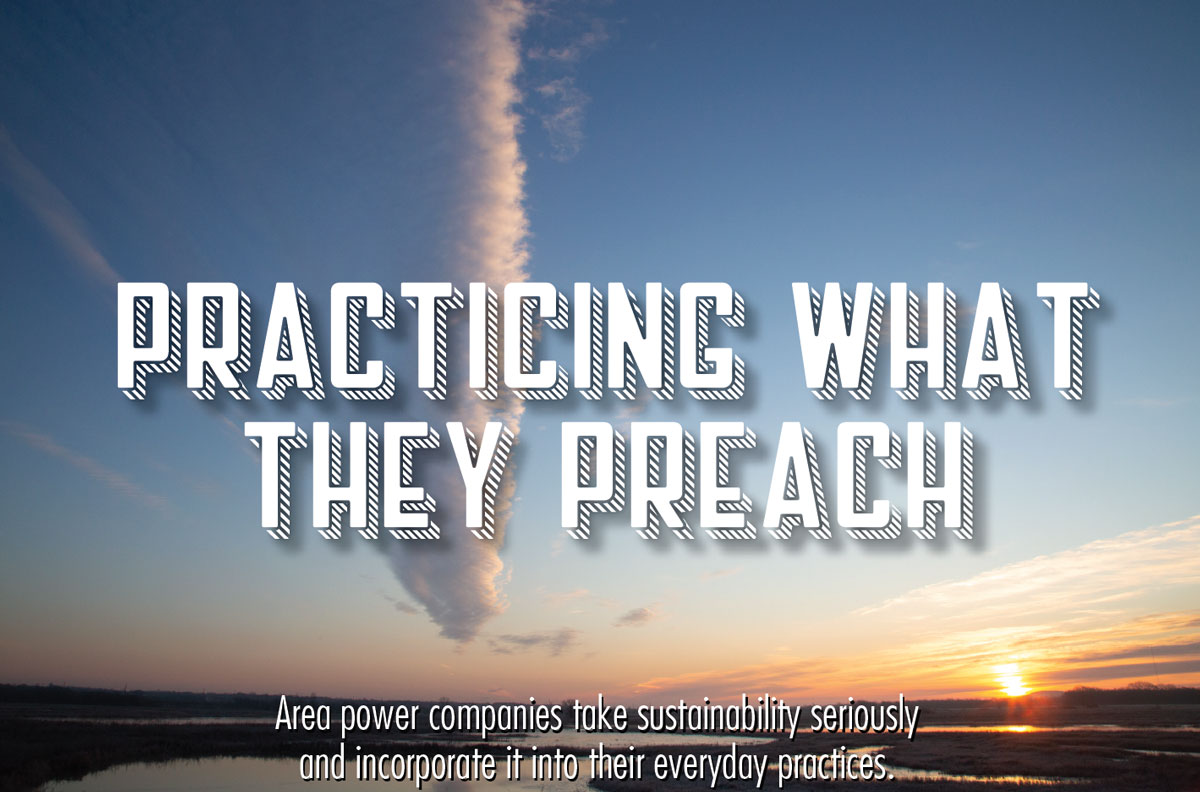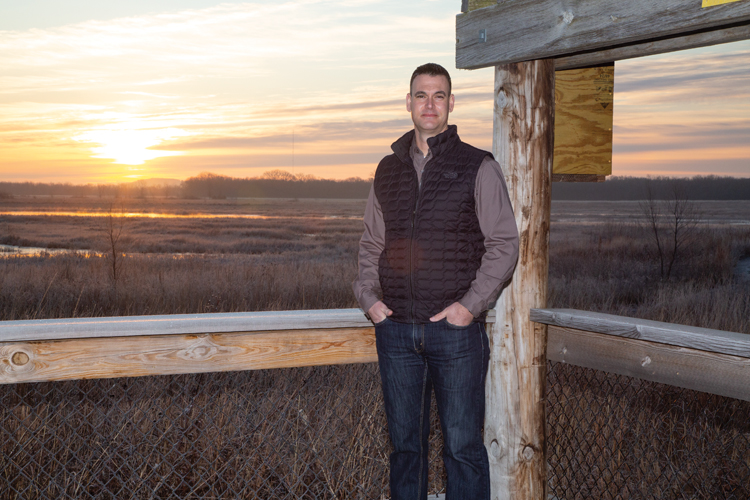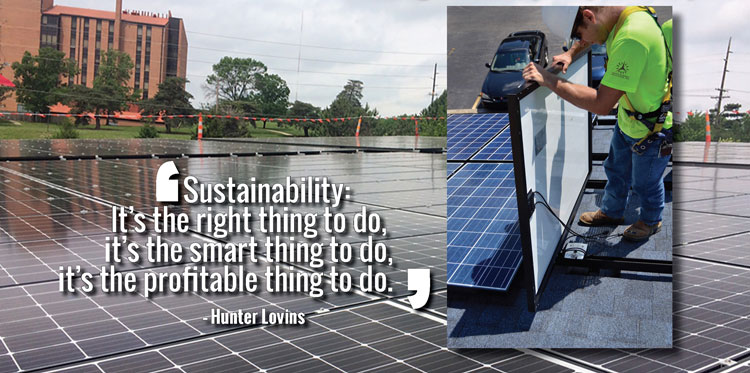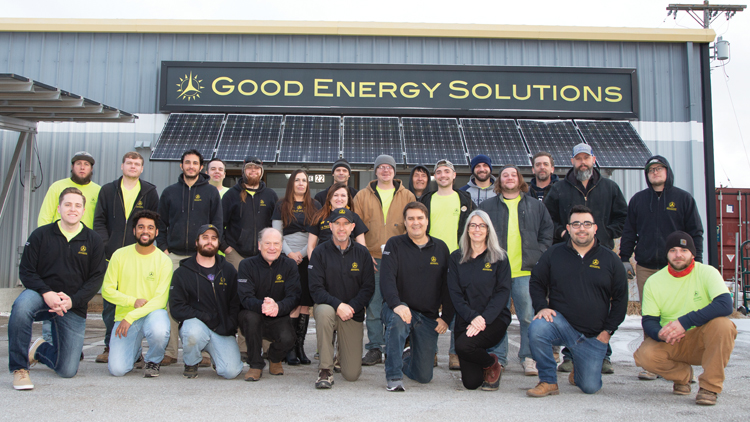Area power companies take sustainability seriously and incorporate it into their everyday practices.
| 2020 Q1 | story by Bob Luder | photos by Steven Hertzog and courtesy of Good Energy

Sunrise at The Baker Wetlands
It makes perfect sense that energy companies would be at the forefront when it comes to sustainability and sustainable business practices and initiatives. After all, the very crux of that 21st -century buzzword, “sustainability,” lies in the conservation of energy resources and use and development of renewable, clean energy for the future. Right?
It might come as a surprise, then, that some energy companies were a bit slow to join the sustainability party early in the century. It’s understandable considering traditional business models dictated that these companies produce electricity for customers while also completing projects expanding infrastructure.
That all changed the last 10 years or so when, for the first time, power consumption and U.S. economic expansion didn’t go hand in hand. Greater energy efficiency in everything from everyday home appliances to industrial processes led to decreased electricity demand even as the economy expanded. Add to that all the reports on the science of climate change and its negative effects, as well as the creation of renewable energy sources such as wind and solar, and well, power companies knew sustainability was the only path to a bright and productive future.
“We certainly believe that the climate is warming due to human sources,” says Kevin Good, president of Good Energy Solutions, a Lawrence-based company that installs solar energy systems and efficiencies to homes and businesses in Kansas and Missouri. “I think everyone is becoming more and more interested (in sustainability) as time goes on. It’s certainly something we’re taking seriously and putting into practice.
“We’re in the renewable energy industry, and we want to practice what we preach,” he continues.
In those endeavors, Good is joined by fellow Lawrence-area energy companies, from behemoth power providers Evergy and Black Hills Energy Corp. to fellow solar installers Cromwell Environmental, as enthusiastic endorsers of sustainable business practices.

Ben Postlethwait, Manager, Biology Conservation and Sustain-ability Programs at Evergy at the Evergy Observation Tower at the Baker Wetlands
Evergy
In June 2018, two prominent power companies, Westar in Kansas and Kansas City Power & Light in Missouri, merged to form Evergy, one of the largest utilities companies in the central U.S. But, as Ben Postlethwait, the company’s manager of conservation and sustainability, explains it, Evergy isn’t concerned with just being the biggest. It wants to be the best it can be.
“When companies are performing well, they’re looked at as more forward-looking companies,” Postlethwait says. “We look at everything our company does across the board to be forward thinking, and sustainability is a big part of that.”
To achieve all the benchmarks it has in place, which includes increasing its percentage of renewable energy resources to 27 percent by this year, Postlethwait says Evergy breaks sustainability into what he calls ESG: environmental, social and governance sustainability.
- • Environmental sustainability is concerned with the rates of renewable resource harvest, pollution creation and nonrenewable resource depletion that can be continued indefinitely. It involves initiatives like emission reductions and use of electric vehicles, and also ties in with governance issues.
- • Social sustainability is a process or framework that promotes well-being within an organization’s own members while also supporting the ability of future generations to maintain a healthy community.
- • Governance sustainability involves company leaders working closely with state and local politicians to enact environmentally friendly legislation that promotes sustainable practices.
To maximize its environmental performance, Evergy has set up a “clean charge network” of more than 1,100 charging stations for electric vehicles across the Lawrence and Kansas City metropolitan areas and recently has partnered with the Kansas Department of Transportation to place some stations along the turnpike.
Seventy percent of Evergy’s fleet of sedan cars are hybrid or plug-in. There are initiatives to reduce idle time on its bucket trucks. In June 2016, the company issued $350 million of “green bonds,” an investment tool that feeds proceeds throughout the year to different sustainability initiatives.
Postlethwait says the company sourced 3,300 megawatts of wind energy in 2019 and plans to add 500 more megawatts this year.
In terms of social sustainability, Postlethwait points to the Evergy Dream Team, made up of 300 to 400 individuals focused on environmental stewardship. The team participates in 50 to 70 volunteer projects each year and sponsors educational events. One of the team’s most notable recent projects was construction of an observation tower on the Baker Wetlands, made strictly with recycled lumber. It also partnered with the University of Kansas School of Architecture & Design on constructing a shade area at Burroughs Creek Park.
“We also have a matching gift program,” says Gina Penzig, external communications manager at Evergy. “We ask employees to suggest nonprofits they want to help, and they choose the nonprofits they want to give to.”
“It’s exciting that this younger generation of employees have a new level of enthusiasm they bring to (volunteerism),” Postlethwait says. “We have a lot of motivated folks that are motivated to get to it. It’s become an important part of employee retention. It gives them a greater stake in their communities.”
The governance aspect of sustainability, Postlethwait says, is undertaken by various board committees and an executive team that meets with government officials on subjects as varying as management of weather cleanup to cyber security.
“We’re not going to pretend to be perfect,” Postlethwait says. “But, we’re working hard to be the best we can be.”

Good Energy Solutions has installed panels in all parts of Kansas and beyond
Black Hills Energy
Black Hills Energy serves natural gas and electric utilities to 1.2 million customers in eight states, including Kansas. For the Lawrence/Douglas County area, it only supplies natural gas.
As stated in the company’s corporate responsibility report, it takes very seriously the balance it must maintain in providing customers with safe, reliable and affordable energy, all while keeping a strong commitment to protecting the environment. James Williams, Black Hills’ community affairs manager, explains the company believes strongly that natural gas is a great “bridge” power resource during the long transition from fossil fuels to renewables.
“Reducing the carbon footprint and generating more renewable energy is a goal and part of Black Hills’ mission,” Williams says. “We are always on the lookout for more wind energy.”
“Natural gas has about half the emissions as you get when you burn coal,” he adds. “When you figure in the affordability of gas, we believe natural gas is a bridge to the future of energy, especially when renewables aren’t available.”
According to the company’s website, Black Hills reduced its carbon footprint from about 3 percent to 16 percent between 2011 and 2018.
When it comes to social sustainability, Black Hills partners with Douglas County CASA (Court Appointed Specialty Advocates), a nonprofit organization that advocates for children in the foster system. In addition to volunteerism, the company donated 50 iPads during the Christmas holidays. Black Hills also is active with the Lawrence Chamber and United Way, and recently granted the Lawrence Arts Center $8,000 for improvements to its black box theater.
All of Black Hills Energy’s public spaces are equipped with timers to maximize energy efficiency, and the company annually provides trees to the community.
“Trees consume carbon, and we’re absolutely committed to reducing greenhouse gases,” Williams says. “Adding trees not only improves the environment but also the community as a whole.”

Good Energy Solutions
Good Energy Solutions
The very nature of its business makes Good Energy Solutions a valuable contributor to sustainable and environmentally friendly energy. But, Kevin Good says initiatives put in place at his company, which started 12 years ago with just he and his wife, and today has more than 30 employees, go much further than that.
All materials used at Good Energy Solutions, from plastic containers to cardboard boxes to paper, are recycled, Good says. Then, there’s the business itself, which in part involves consultation with companies and homeowners on how to increase energy efficiencies.
“Anything we can do to prevent adding to the causes of pollution and climate change,” he says. “We go to a building and see how we can tie energy efficiencies into energy use. Any company trying to reduce energy usage … we try to get them to that place.”
Good says solar sales at Good Energy Solutions jumped 75 percent in 2019 over the previous year, when sales had increased 30 percent.
“People are realizing it’s commercially less expensive to get energy from solar,” Good says. “And, you can actually increase the value to a home by reducing energy costs through solar.”
Good Energy also is involved in social sustainability. The company adopted a piece of the Burroughs Creek Trail, and every business quarter, employees volunteer to go out and clean debris out of the area. It also recently donated a solar system to a local nonprofit and donates used pallets to Haskell Indian Nations University.
Good says he’s also spent plenty of time in Topeka at the state capital trying to bring bills before various committees that promote sustainable energy.
“We want to protect customers from big corporations trying to force them into using the energy they want them to use,” he says.
Cromwell Solar
Like Good Energy, Cromwell Solar, a division of Cromwell Environmental, is an installer of solar energy systems and performs environmental services commercially and domestically throughout the area and beyond. In fact, having been in business for more than 40 years, Cromwell is one of the oldest companies in the region to install solar.
“Solar energy makes a tremendous positive impact on climate, eventually freeing ourselves from harmful fossil fuels,” says Clint Idol, Cromwell’s vice president of operations. “For us, it starts with advocacy and working with policymakers to make sure renewable alternatives are a free choice or affordable choice.
“We’re leading the charge with the state legislature to get legislation passed to make solar affordable,” he continues. “I’m confident we’ll get that done.”
Idol says Cromwell is a “net-zero operation,” generating all the energy it needs through solar power.
“Our building is powered exclusively by sun power,” he says. “We provide more sustainable energy than we use.”
Idol says Cromwell also partners with the City of Lawrence in its commercial pilot recycling program. It composts all waste. Used pallets are either recycled or offered to others for repurposing. The company also is philanthropic, providing equipment and/or consultation to those in need. Most of its 28 employees are involved with civic task forces, sustainability action networks or sustainable causes such as Friends of the Kaw, Sierra Club and the Lawrence Arts Center.
Cromwell also is the first installer in the Lawrence area of Tesla batteries for Tesla Powerwalls, which allow homes or businesses to store energy and avoid peak demand hours.
Like Good Energy Solutions, Cromwell’s business is booming. But, as Idol sees it, that trend is as inevitable as, well, the sun coming up in the morning.
“Change is difficult for everybody, particularly when it involves resources that everybody uses,” Idol says. “But, I think the future looks like free, sustainable power resources for everyone. That’s the only way out of this. It has to happen, and I think it will.”




